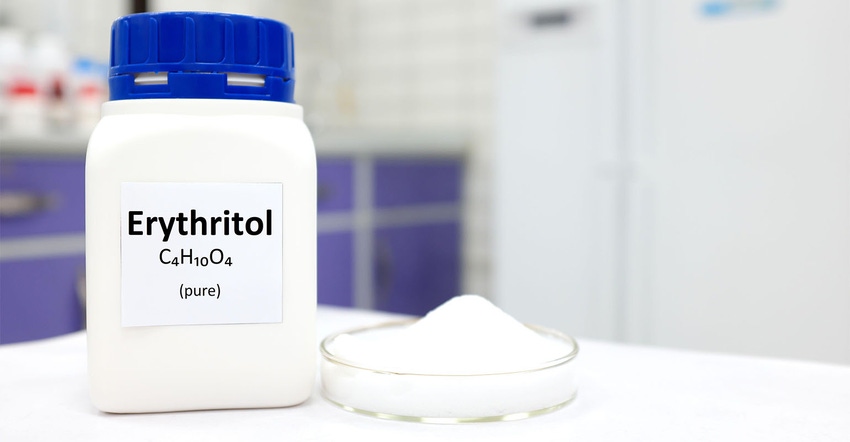Brands haven't seen much consumer reaction, but are looking for alternative sweeteners in case long-term studies support causation of cardiovascular problems.
April 18, 2023

Executives whose brands use erythritol as a sweetener in their products aren't panicking about a Cleveland Clinic study linking the sweetener with a risk of major adverse cardiovascular events. But they aren't looking the other way, either.
While the news proved a headache for companies that formulate with this well-established sugar alcohol—and a hyperbole-filled field day for some major media outlets—it's important to note that the study had limitations. The study, which was published in February in the journal Nature, demonstrated association, not causation, and the authors noted that more studies are needed to determine the long-term safety of erythritol.
As reported in Food & Beverage Insider, erythritol has been commercially produced and added to foods and beverages for more than 30 years. "The safety of erythritol as a food ingredient under conditions of its intended use is substantiated by a number of human and animal safety studies, including short- and long-term feeding, multigeneration reproduction and teratology studies," noted the Calorie Council.
But CPGs formulating with erythritol can't simply write off the study, for a number of reasons. There are consumer perceptions to be dealt with, as well as the fact that no one knows what those follow-up studies may reveal.
"It's the top of the first inning anytime there's a new research article like this," explained Todd Bondy, president and chief financial officer of beverage maker CLEAN Cause. "We're doing what we can to better understand the research, but in the immediate term, it isn't anything for us to act on."
While Bondy doesn't advocate knee-jerk reactions, he does believe in being ready to react. Fortunately, the ability to pivot when an ingredient becomes problematic is a skillset that many companies have become adept at in this post-COVID world. "All the supply chain disruptions over the last few years forced us to look at all of these things differently," Bondy said, "We've all had to evolve and be a lot more proactive in thinking through risk mitigation—that includes around ingredients."
Regardless of which way the research goes, Gatherer's Granola CEO and Founder Alessandro Gerbini also felt it was important to investigate options. "As soon as the report came out, we reached out to our preferred ingredient suppliers for non-sugar sweeteners and started receiving samples of alternatives, not based on erythritol," he said.
Gerbini pointed out that once a scientific can of worms like this gets opened, it's not just future research you need to keep an eye on. "We began formulating alternatives assuming the worst, assuming that this is verified," he said. "But even if it's not verified, it can generate enough fear to change behavior independent of facts.
"At the very least, it's an opportunity for us to diversify and provide something that is substantially different from the rest of the industry and be faster than them in doing so," he added.
As fate would have it, CLEAN Cause had diversification on its roadmap before the study, with a soon-to-be released non-sparkling line. "We understand different consumers have different preferences in a number of ways," Bondy explained. "So coincidentally, for whom this may be a hang-up, we're happy and excited that we have another offering that's coming out in the next few months that doesn't contain erythritol."
That said, when it comes to the study, the hung-up demographic doesn't appear to be that dominant. "We've had less than one handful of people who've reached out to us in regards to this study," Bondy said. "But we are where we are because of the support we get from people, so we don't take any questions like this lightly, from anyone. We just want to make the best products for our customers."
Gerbini of Gatherer's Granola also said that few consumers have responded. "So far as I've been able to tell, we've not had a significant impact on rate of sales," he said. "We are a co-manufacturer as well as a brand, and our clients have been on pace or above rate of sales this time last year—and they exclusively sell in the category of erythritol."
"I would certainly encourage any manufacturer to do something similar to what we're doing, which is stay the course of continuing to make erythritol products available," Gerbini said. "Don't yank them off the shelves based on one study that has yet to be duplicated and with what appears to be continuing strength of demand—and then get ready to make something else available in the worst-case scenario."
About the Author(s)
You May Also Like




